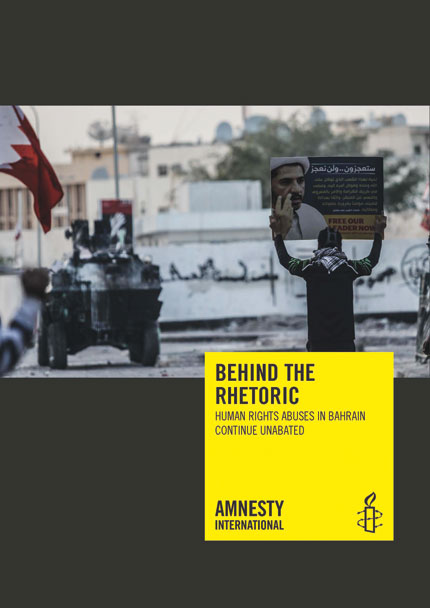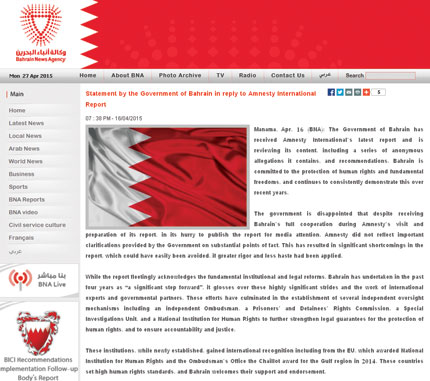
|
 |
 |
|
|
|
|
|
|
|
|
|
|
|
|
|
|
|
|
|
|
|
|
|
|
Amnesty’s Report on Issues of ConcernThe Government: The Report Presented
|
 |
But the report also noted what it described as a continuation of the climate of repression and the decline in public freedoms especially the freedom of assembly and peaceful protesting and pointed to the harassment and prosecution of activists and restrictions it saw on non-governmental organizations in addition to what the report claimed was targeting political associations. It also assessed the anti-terrorism law enacted by the government recently.
The report discussed in length the revocation of citizenship by either the Ministry of the Interior or the courts as well as the issues of arbitrary detention and prison conditions and made recommendations in all these issues that are deemed of concern in order for them to be addressed and rectified.
The report concluded that there is a failure in achieving basic human rights reforms and that there is a continuing crisis which in order to be addressed requires: harmonizing domestic laws with international standards; releasing all those detained for exercising their lawful right to freedom of expression, association and peaceful assembly; beginning comprehensive judiciary reforms in order to ensure full impartiality and independence from the executive branch.
Among the recommendations made in the reportby Amnesty International were thorough investigations into allegations of torture and deaths in custody, compensating the victims and their relatives appropriately, ordering retrials for each of those convicted in the trials that did not meet the conditions of a fair trial, ensuring the application of the principle of accountability and no impunity, lifting the ban on peaceful protests, removing restrictions on freedom of expression and association, adopting a l?w for non-governmental organizations that respects and protects their freedom of establishing and to ensure that all human rights defenders, human rights organizations are able to do their work freely.
The report called for directing the police to adhere to international standards on the rules of engagement during protests and to ensure that law enforcement officials receive regular training to perform their duties which must include respecting and applying of human rights principles.
Finally, the report called for allowing the Special Rapporteur on torture, the Special Rapporteur on the independence of judges and lawyers to visit Bahrain and to cooperate with international human rights organizations and pave the way for them to visit Bahrain.
The Official Response to the Report
The Bahraini government issued in a statement on April 16, 2015 saying that it has received Amnesty International’s report and is reviewing its content and recommendations “including a series of anonymous allegations it contains” It affirmed its unflinching commitment to the protection of human rights and basic freedoms, and said it continued to consistently demonstrate this in recent years.
 |
The statement added that “despite receiving Bahrain’s full cooperation during Amnesty International’s visit and preparation of its report, in its hurry to publish the report for media attention, Amnesty did not reflect the facts that were provided in all clarity and transparency including important clarifications provided by the Government on substantial points of fact”.
“This has resulted in significant shortcomings in the report, which could have easily been avoided, if greater rigor and less haste had been applied,” the government position stated.
The government statement observed that Amnesty International “fleetingly” acknowledged the fundamental institutional and legal reforms that Bahrain has undertaken in the past four years and described as “a significant step forward” but it “glossed over these highly significant strides and the work of international experts and governmental partners which culminated in the establishment of several independent oversight mechanisms including the Ombudsman Office at the Ministry of Interior, Prisoners and Detainees Rights Commission, Special Investigation Unit at the Public Prosecution, and a National institution for Human Rights to further strengthen legal guarantees for the protection of human rights, and to ensure accountability and justice”.
The official response stated that these institutions, while newly established, gained international recognition including from the European Union (EU) which awarded the National Institution for Human Rights and the Ombudsman’s Office (the Chaillot award) for the Gulf region in 2014 stressing that these countries “set high human rights standards”.
The Bahraini government statement criticized Amnesty International because it “fundamentally misreported Bahrain’s respect of the rights to freedom of opinion and expression and to peaceful assembly. These rights are protected by Bahrain’s constitution, and the government continues to uphold them robustly”. But the Bahraini government “as any other responsible government will not tolerate violent attacks or incitement to violence committed under the guise of free speech and peaceful protest” stressing that?it is the government’s duty “to protect citizens, residents, and visitors alike and the government makes no apology for doing so. Bahrain will respond to such attacks in accordance with its law and best international practices”.
The official response concluded with saying that “Bahrain has a strong track record of openness to dialogue and cooperation with human rights organizations, allied countries and the United Nations. It will continue this cooperation and to welcome accurate and factual reporting on developments and accomplishments in the country”.